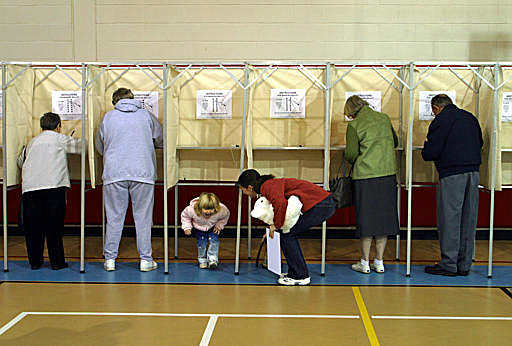Undecided Voters Probably Have Decided

Many voters who say they haven't decided between the two presidential candidates actually have decided. They just don't know it, finds a new study.
With the race to the White House being fiercely fought as ever, the undecided voters could make all the difference, and so while polls can give current trends in voter choice for one candidate over another, albeit possibly inaccurately, they don't tell us where the undecideds stand. Still, if they could cough up their true opinions, a different picture might emerge. "Undecided voters may have decided implicitly before they know that they have explicitly," said researcher Brian Nosek, a psychology professor at the University of Virginia.
Hidden preferences
Nosek and his colleagues analyzed survey data collected on a research and educate Web site called Project Implicit in which visitors can complete a test that measures their implicit associations on a variety of topics. In this survey, more than 25,000 participants completed a computer task that measured their unexpressed views regarding presidential candidates Barack Obama and John McCain.
During the task, participants are told to push a key on their keyboards when they see pictures of Obama and positive words such as "love" and "friend," while pressing another key for negative words such as "enemy" and pictures of McCain. The participant completes several iterations of this task where the lineup is switched and you have to press one key for McCain and positive words, and another for negative words and Obama.
About 15 percent, or some 4,000 individuals, declared themselves as undecided between Obama and McCain (this would be considered an "explicit" opinion). However, more than 60 percent of these undecideds showed an implicit, though unexpressed, preference for either Obama or McCain in Nosek's study.
On average more undecided voters reported explicitly feeling slightly warmer toward Obama than McCain, but Nosek's implicit measurements showed the undecided subjects had a slight preference for McCain over Obama.
Sign up for the Live Science daily newsletter now
Get the world’s most fascinating discoveries delivered straight to your inbox.
"Participants are often surprised to learn that they may have unconscious biases regarding candidates, or racial or religious views that are quite different from their stated beliefs," Nosek said. "For example, few people in modern society are actively racist, but most of us possess implicit associations linking white people with good and black people with bad more easily than the reverse."
Implicit views
Implicit and explicit preferences sometimes do match up, Nosek found. Overall, for decided and undecided voters alike, Democrats implicitly favored Obama, while Republicans were strongly pro-McCain, both of which match their reported, or explicit, preferences. Independents were implicitly pro-Obama, on average.
Our unexpressed, and often unknown, preferences can be shaped by the social environment surrounding us. In the case of presidential candidates, if we live around and are exposed to lots of pro-Obama or pro-McCain messages, our minds could lock in those positive associations, Nosek said.
"So one thing our implicit preferences might project, more than our self-reported preferences, is how much in our everyday life we have developed positivity or negativity in terms of associations with these different candidates," Nosek told LiveScience.
The jury is still our on whether or not these implicit views will trump our self-reported preferences in the voting booth.
Nosek warned that although the sample is large, it is not representative of all voters in the United States. "With this study, we cannot draw conclusions about the electorate as a whole or whether implicit preferences are strong enough to swing the election," Nosek said.
The researchers are now using a similar implicit test to figure out whether race has any bearing on a person's implicit preferences for one presidential candidate over another. (You can take the test here: http://implicit.harvard.edu.)
- Video - Presidential Marketing Power
- Quiz Bizarre U.S. Presidential Elections
- Top 10 Ailing Presidents
Jeanna Bryner is managing editor of Scientific American. Previously she was editor in chief of Live Science and, prior to that, an editor at Scholastic's Science World magazine. Bryner has an English degree from Salisbury University, a master's degree in biogeochemistry and environmental sciences from the University of Maryland and a graduate science journalism degree from New York University. She has worked as a biologist in Florida, where she monitored wetlands and did field surveys for endangered species, including the gorgeous Florida Scrub Jay. She also received an ocean sciences journalism fellowship from the Woods Hole Oceanographic Institution. She is a firm believer that science is for everyone and that just about everything can be viewed through the lens of science.









